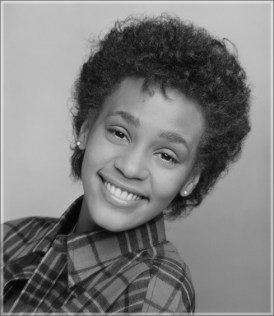
The bisexual rumors that swirled around Whitney Houston for nearly three decades have been re-ignited this week following her tragic death last Saturday. On Sunday, LGBT and Human Rights activist Peter Tatchell wrote on his facebook wall that Whitney “was happiest and at her peak in the 1980s, when she was with her female partner. They were so loved up and joyful together. It’s important to tell the truth about this aspect of her life. Colluding with the cover-up of her same-sex relationship is not right.”
I had to stare at that sentence for about ten minutes, wash some dishes and come back and read that sentence again and then again and still I wasn’t really sure what to think about it.
For starters, it’s awfully bold for Tatchell to posthumously confirm a relationship Houston herself denied multiple times. There’s a case to be made that it’s never been more relevant; despite how much Hollywood loves to portray fictional bisexuals as drug addicts, when faced with an actual bisexual drug addict, nobody seems to want to talk about the way that discrimination or secrecy around sexual orientation can contribute to or complicate mental health and substance abuse issues.
Similarly, to argue that it’s unseemly to discuss her lesbian relationship at this point implies there’s something unseemly about having a lesbian relationship to begin with. Michael Musto at The Village Voice commented that “not surprisingly, the one thing that’s being left out of the vast majority of Whitney Houston obits is the L Word! But it’s hardly a dirty word… shouldn’t we acknowledge that this great singer was bisexual? And didn’t the way she always ran from the rumors contribute to her own self-defeating tendency for drama and tension?”
Today, TNT Magazine writes: “Whitney Houston binged on drugs and alcohol because she was in turmoil over secret lesbian relationships, it has been claimed.”
And The Daily Mail got in on the action: “Whitney Houston was a secret lesbian and binged on the drugs and alcohol that killed her because she was torn over living a lie, it has been claimed.”
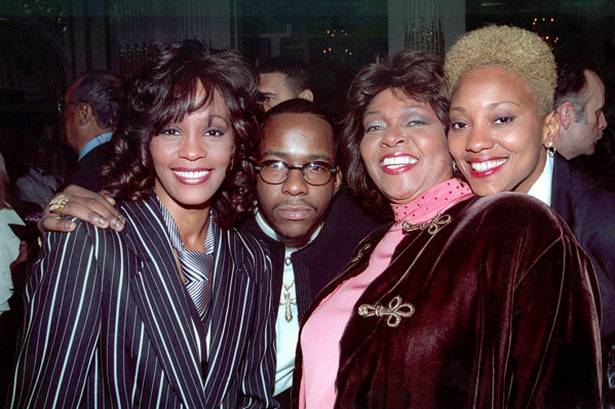
OurBiNation, in response to The Daily Mail piece, made this observation: “Today what bothers us most is that the word ‘bisexual’ is never mentioned in the article (How many men did Ms. Houston have to have sex with to not be gay?), and regardless of her state of mind before her death (We will never really know), if she was depressed, her mental state should shine a light on the poor quality of mental health for all bisexuals.”
And here’s what else Tatchell had to say on his facebook post: “I met Whitney and her partner at the Reach Out & Touch HIV rally in London in 1991, organised by Vernal Scott. Whitney spoke very movingly in support of people with HIV, at a time when many other stars kept their distance. She was pressured into the Bobby Brown marriage. It was a disaster. Her life started going downhill soon afterwards. Perhaps her inability to accept and express her same-sex love contributed to her substance abuse and decline? Whitney’s death is a tragic loss of a great vocal talent.”
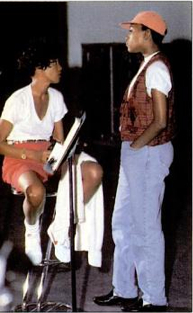
Before we even get into the Bobby Brown situation, let’s back up and recap the rumors for those of you uninitiated into this tale. It’s actually a sweet story, whether it’s the story of a lesbian relationship or a best friendship.
Whitney Houston met Robyn Crawford when they were both teenagers in East Orange, New Jersey, and they hit it off right away. Crawford eventually dropped out of college to work for Houston, and the two shared an apartment despite the fact that — as Tricia Romano points out — Houston, who’d already sold 13 million records, clearly could afford to live alone.
From a 1987 Time Magazine article about Whitney Houston entitled “The Prom Queen of Soul”:
At 17, Whitney completed her extended family when she met the “sister I never had.” Robyn Crawford — tall, slim, severely handsome — was 19 then; they have been nearly inseparable ever since. Four years ago Robyn dropped out of Monmouth College, where she had played basketball on scholarship, and later became Whitney’s personal assistant. They share a North Jersey flat with a view of Manhattan.
Because of their easy intimacy, the tattle mill has ground out the story that they are lovers. Both women shrug off the rumor. Says Robyn: “I tell my family, ‘You can hear anything on the streets, but if you don’t hear it from me, it’s not true.’ “
Whitney also alludes to family: “My mother taught me that when you stand in the truth and someone tells a lie about you, don’t fight it. I’m not with any man. I’m not in love. People see Robyn with me, and they draw their own conclusions. Anyway, whose business is it if you’re gay or like dogs? What others do shouldn’t matter. Let people talk. It doesn’t bother me because I know I’m not gay. I don’t care.”
I’ve seen that interview quoted at least five times this week, and it’s used as evidence that Whitney was almost unnaturally cool about the rumors, which makes her incredibly ahead of her time. But according to Karla Jay’s 1996 book Dyke Life, Houston’s publicists weren’t quite so cool about it, and they “issued nearly forty statements denying that the singer’s relationship with then longtime companion Robin Crawford was lesbian.”
In a 1991 interview with Whitney, Ebony magazine describes how as teenagers “Robyn was an All-State basketball star and Whitney was a shy, aspiring singer and favorite target of inner-city bullies.” Robyn was the outgoing one, and her friendship made Whitney feel safe. The article also addressed the rumors about their affair:
Of all the rumors, Whitney is most irked — and hurt — by allegations that she is involved in an affair with her close friend and executive assistant, Robyn Crawford. “I realize that this thing has been fueled by the fact that I’m very private with my life,” she says. “I don’t make it my business to expose my relationships; it’s hard enough just to keep one. So I figured that since people didn’t know who I was sleeping with, they just assumed I was sleeping with Robyn.”
[…] To the media she declares: “You don’t live with me every day! So how can you say that this is what I am or what I do?”
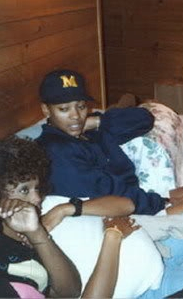
Houston also said some interesting things about what she looks for in a partner, while addressing rumors about liaisons with Eddie Murphy and Arsenio Hall:
“Basically,” she says, “if you put Whitney Houston aside, what you’ll find is a woman. You put Eddie Murphy aside, you’ll find a man. You put Arsenio aside, you’ll find a man. All that other stuff is just the ‘gravy’ we have become. But before we were this, we were humans. People. That’s the bottom line.”
In the 90’s, there were additional lesbian rumors, this time about Whitney Houston and actress Kelly McGillis, who came out in 2009. It was rumored that Houston frequently visited McGillis in Chicago during the filming of 1991’s The Babe. McGillis has since said that she’s never even met Whitney Houston:
As for the rumor-turned-urban-legend that Kelly was involved in a three-way lovers’ spat with Jodie Foster and Whitney Houston during the filming of The Accused, Kelly laughs and crushes that with a single blow: “I’ve never met Whitney Houston. I think she’s vastly talented, but I have never met the woman.
Then Houston married Bobby Brown, which quieted the rumors about her bisexuality somewhat (despite the fact that marrying a man does nothing to discredit one’s bisexuality, but whatever) or at least jump-started a new round of rumors, this time focused on her alleged drug use and turbulent marriage. Crawford was Houston’s maid of honor, but she moved out shortly after Brown and Houston struck up their affair and “by 2000, was no longer “part of Whitney’s empire.”
Then there was this interview in 1999 about her performance at New York City’s Gay Pride, in which she makes a point of pointing out that it’s not her pride, it’s “their pride” and she’s “just there to entertain”:
In May 2000, Whitney Houston appeared on the cover of OUT Magazine, another bold statement for an actress dogged by lesbian rumors. In addition to, I hope, covering her AIDS-related organization charity work, the article dug into her sexuality again:
“That ain’t me, I know what I am, I’m a mother. I’m a woman. I’m heterosexual. Period. But I love everybody. If I was gay, I would be proud to tell you, ’cause I ain’t that kind of girl to say, “Naw, that ain’t me.” The thing that hurt me most was that they tried to pin something on me that I was not. My mother raised me to never, ever, be ashamed of what I am. But I’m not a lesbian, darling, I’m not.”
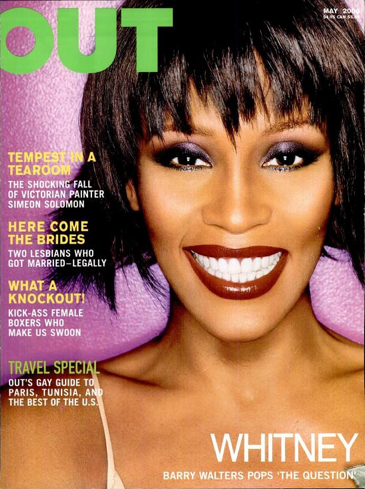 Later in the story:
Later in the story:
“I am me, I’m a mother. I love to hear my child call me mommy. That’s what I am, not lesbian, not gay, not all the bullshit. I don’t wanna hear that. It’s over. It’s done.”
Houston’s typical defensiveness suggests, of course, that she hasn’t really moved on at all. When I tell her that I believe she’s straight, she retorts, “It’s not for you to believe me. I don’t give a shit if you believe me or not.”
After her divorce from Bobby Brown in 2007, Brown began hyping a “tell-all” biography entitled Bobby Brown: The Truth, The Whole Truth, And Nothing But, which promised to reveal the whole truth about Houston’s sexuality. An excerpt from the book was leaked to The New York Post in April 2008, which read as follows:
“I think we got married for all the wrong reasons. Now, I realize Whitney had a different agenda than I did when we got married … I believe her agenda was to clean up her image, while mine was to be loved and have children… The media was accusing her of having a bisexual relationship with her assistant, Robyn Crawford. Since she was the American Sweetheart and all, that didn’t go too well with her image . . . In Whitney’s situation, the only solution was to get married and have kids. That would kill all speculation, whether it was true or not. In the short, I think I got caught up in the politics and ended up marrying one of the biggest stars in the world.”
It’s a cold assessment from a man who did more to fuck up Whitney’s image than Robyn could ever dream of, and it also seems a bit unfair — while I honestly know next-to-nothing about their relationship, I’ve read a lot of Being Bobby Brown recaps on fourfour and it seems like if nothing else, she genuinely loved him, for better or for worse. It was not a farce. Besides, how the hell could Bobby Brown “clean up” Whitney’s image?
According to The Daily Beast, gossip reporters like blogger Daryl Deino continued to say that it was “common knowledge that Whitney and Robyn were together” as late as 2009: “Anybody who works in the recording industry knows about Whitney and Robyn’s relationship; they barely did anything to hide it during recording sessions.”
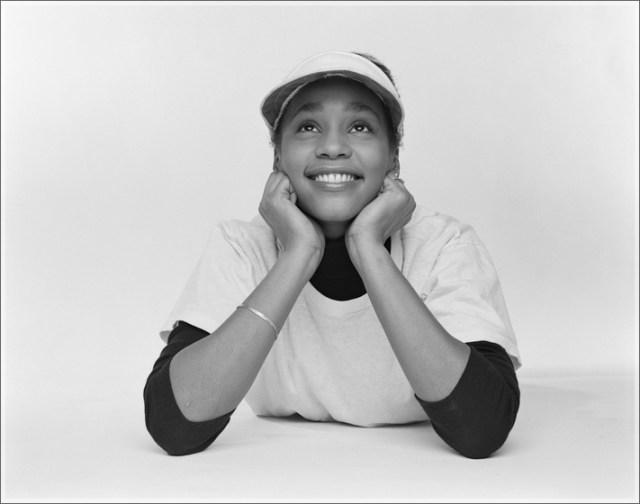
So that’s where we were at last week. Today, Esquire published a poignant and respectful obituary for Whitney Houston written by Robyn Crawford herself, which says really lovely heartbreaking things like, “She looked like an angel. When my mother first met her, she laughed and said, “You look like an angel, but I know you’re not.” And she wasn’t. But she looked like one.” And also:
“I have never spoken about her until now. And she knew I wouldn’t. She was a loyal friend, and she knew I was never going to be disloyal to her. I was never going to betray her. Now I can’t believe that I’m never going to hug her or hear her laughter again. I loved her laughter, and that’s what I miss most, that’s what I miss already.”
So, does it matter? Is it meaningful to claim her as one of our own? Is it important to cast light on the specific mental health and substance abuse issues faced by bisexual people? Is it important relative to the complicated history between bisexual celebrities and posthumously published accounts of their allegedly bisexual lives? Is it an important chapter in the conversation about LGBT African-American celebrities specifically?
I always want things to be bigger — to find a way to make a bigger point, reach a universal conclusion, find a way to make pop culture socially relevant. If Whitney Houston had come out as a woman in a lesbian relationship she would’ve been the most famous person to have ever done so. I don’t know if there’s any way to relate to that. She’s so much bigger than anything we’ll ever understand.
FourFour said something in his brief post about Houston’s passing, referencing her drug use specifically, that seemed to perhaps be the only thing there is to say:
To think of anyone’s life as a cautionary tale is condescending (true acceptance includes flaws) and selective. Unless you are model-pretty with the best voice on the planet and have been rewarded for both with international celebrity, Whitney’s complicated story doesn’t apply to you. The best we could ever do was admire it from afar, the worst we could do is reduce it to a one-sentence moral.







